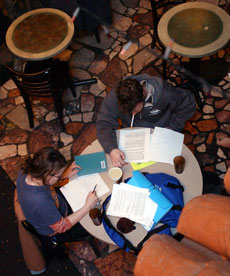UI offers resources to help combat stress

Shira Weissman
October 19, 2004
University senior in ACES Craig Shepherd relaxed on his couch Wednesday afternoon. He had survived the first midterms of the year.
Shepherd, a fifth-year senior, is used to the stress. Others in his position might not be as well adapted.
Students who do find themselves stressed can get help at the University Counseling Center.
Starting in late September, there has been an increase in the number of students that head to the Counseling Center seeking help, said clinical counselor Greg Lambeth.
Students can call as early as 7:50 a.m. to schedule an appointment to meet with a counselor the same day, if they are utilizing the Counseling Center for the first time.
Get The Daily Illini in your inbox!
Many students who seek help at the Counseling Center are overwhelmed or suffer from anxiety.
Lambeth said counselors at the center are prepared to help students get over their fears. They can give advice on good time-management practices and organizational skills too.
Though students’ behavior changes completely when midterms roll around, Lambeth said it is important to maintain a sense of balance.
Many coffee shops fill with students studying, however Lambeth said it is important that students regulate their consumption of caffeine. He also added that it is important that students limit their
alcohol intake.
Students should also take breaks when studying, Lambeth said. They cannot study at their peak for long, uninterrupted hours.
“Most people have a finite time they can study at peak productivity,” Lambeth said.
Usually, when students have reached their limit of effective study time, they begin to “space out.” Lambeth said spacing-out is the brain’s way of taking a much-needed break.
Shepherd’s study habits follow a similar pattern.
First, he tends to procrastinate by cleaning his room, “even though it’s already clean.”
Then he gets down to business, mostly. Once he starts studying, he grabs a bag of barbecue-flavored sunflower seeds and cranks up his music. Occasionally, he will take a break though, which Lambeth recommends.
Shepherd and his roommates can always tell when someone else has an exam looming, Shepherd said.
Usually the person studying will have his door closed and will “be in there all night while everyone else plays video games and stuff,” he said.
Lambeth said it’s important to make sure that students keep in contact with their friends and family, even if they are busy studying.
“Semesters are long, and I think it’s important to balance academics and (one’s) personal life,” Lambeth said.
Often, Lambeth said, he thinks students focus on the short-term goal of getting through midterms. Students can, in their worry about midterm exams and finals, forget about the long-term goal, which is getting a degree.
Lambeth encourages students to use the academic resources available at the University. He also recommends that students study in groups, if that is helpful.
According to the McKinley Health Center Web site (http://www.mckinley.uiuc.edu/wellness/hot topics/relaxation room flyer.html), students who would like to combat the stress can also take a break at McKinley.
McKinley features a Relaxation Room where students can listen to compact discs and tapes. Information booklets about self-esteem and stress can be found there as well. The Counseling Center also has brochures that might be helpful.
Still, many students find that simple adjustments to their study habits would make preparing for exams easier.
Shepherd said he believes studying would have been easier, at least in one case, if he had “taken the plastic wrap off the book before the night before the exam.”






